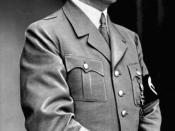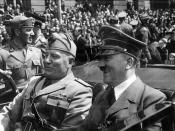Among all the factors that led to Hitler's rise in power, some were more crucial than others. The Social Democrats and the Center Party failing to form a coalition, the depression, and the passing of the Enabling Act were of the more critical ones.
The depression in the early 1930s helped Hitler's rise to power, because during a time when people were in need, he was able to promise them things like food and shelter, and they had no choice other than to believe him. Although he never carried through on his promises he still gained popularity during this rough period, popularity that would eventually help him in later elections. Hitler was also a very radical man, and in a time period where nothing seemed to be right people were looking for change, so the gene
During the 1930 elections, Adolph Hitler and his National Socialist Party won only 107 seats, good for second in the parliamentary race.
Although it was an immense jump from their previous showing of only 12 seats, the Social Democrats still took the lead with 143 seats or 24.7% percent of the votes. However, they remained hostile towards both the Communists and the Center Parties, both of which whom had enough seats to claim the outright lead and become a majority government if allied with the Social Democrats. Heinrich Brüning, leader of the Center Party, was then named Chancellor by Hindenberg. Brüning tried to balance Germany's economy, but Hitler opposed that, and was looking for a radical change. In July, 1932, elections were held once again, this time Hitler's Party received an ever rising 230 seats, however parliament was dissolved, and re-elections were held in November. In the re-election, National Socialists lost 34 seats to the Communists who were increasing in popularity, but there...


